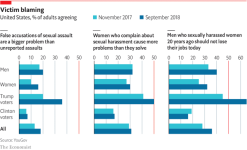Fucking hell, people are stupid.
But thinking a bit about it, it makes sense.
What's your theory?
It's just game theory. The more women are believed, the more women will game the system and make false accusations. I think that's why we tend to punish victims. Ie, if we hear an accusation we'll treat the accused as guilty, but we'll also tend to treat the accuser as falsely accusing. As a way to hedge the bets. It's the only way to guarantee that we're not being fooled.
And we're a social species. These kinds of accusations must have been around from the time we were hunter/gatherers. Which implies that we have sophisticated psychological machinery, already in place, to ferret out who is guilty.
Which suggest that we've already reached an equilibrium regarding trust/distrust of these kinds of accusations. So the more women are believed, the more women exploit the increased trust, which decreases trust, and so on ad infinitum. Equilibrium.


